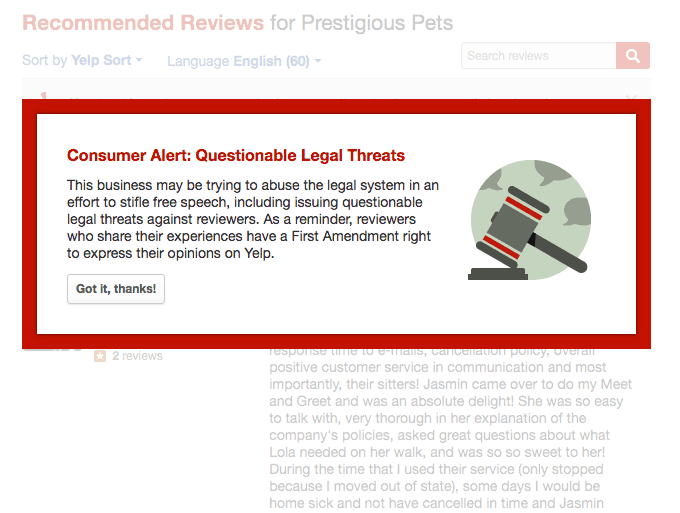
How far would you go to fight negative online reviews?
When someone writes a negative review about your business, it can seem like a personal attack. You’ve put countless hours, dollars, and gallons of sweat into your business, so when someone dismisses your business with a few angry paragraphs targeted at your hard work and creativity, it’s easy to get upset.
This is compounded by the fact that, from many perspectives, Yelp bullies business owners. I’m not the biggest fan of Yelp, and the way they sometimes filter reviews based on if you’re paying them often seems like extortion.
The same might be said for TripAdvisor, too.
So if anyone can write something negative about your business for the world to read, and Yelp’s not exactly in your corner, what do you do? How far would you go? Would you use bullying tactics?
Michelle Duchouquette was definitely bullied by a doggie daycare when they slapped her with a $1 million dollar lawsuit because she left them a bad review.
And it wasn’t even a hateful review. As Boston’s CBS affiliate reports, he just said she didn’t appreciate their $5 dog walking fee or their cloudy fishbowl water. As far as negative reviews go, that’s pretty mild.
So how can this doggie daycare sue a customer for leaving a fairly innocuous negative online review?
The short answer? A gag clause.
The Gag Clause

Many service-based companies place what experts call “gag clauses” within the fine print of their service agreements.
These clauses bar consumers from leaving negative online reviews, and leaves those consumers open to legal action or financial penalties if they decide to leave such a review.
The biggest problem here is that the average consumer doesn’t read the fine print, so most people are unaware they’re agreeing to these gag clauses.
Michelle Duchouquette is not an isolated case. It didn’t take me long to find several other examples of consumers suffering the consequences of violating a business’ gag clause.
GovTech.com reports:
“Several cases involving gag clauses have drawn national attention in recent years. In one instance, an online novelty gift company allegedly demanded $3,500 from a Utah couple who posted a negative review about poor customer service on ripoffreport.com. The couple refused to pay and ran into trouble getting credit after the company reported the unpaid debt.”
A New York woman also called a Staten Island contractor dishonest in a Yelp review, which ended up costing her $1,000, in addition to the money she paid for an unfinished floor replacement.
State legislatures in Maryland and California have already enacted laws to prohibit these gag clauses, and several other states are considering following their lead, including Massachusetts.
It may be happening on a Federal level, too.
Also from GovTech:
“A federal measure that would ban consumer gag clauses also is moving through Congress. The U.S. Senate passed the Consumer Review Freedom Act by unanimous consent in December. Last week, a House Energy and Commerce subcommittee adopted a related bill and forwarded it to the full committee.”
Additionally, Yelp and TripAdvisor seem to be fighting against these gag clauses, as well.
In some instances, these review sites are placing bright red warning messages on an offending businesses’ page if it’s discovered there’s a gag clause in effect.

But these gag clauses mean one thing– business owners are afraid of the damage a handful of negative reviews can cause.
Though I don’t think it’s the most advisable path to take, a gag clause is one way of fighting back against third party review sites.
Silencing Your Customers’ Online Reviews
You may see a gag clause as a necessary defense mechanism, but what do your customers see?
How will current and potential customers view you if they find out you’re suing someone for leaving a negative review, and that you have a gag clause built into your service agreement?
My guess is they’d choose to buy from another business. Suing a customer for leaving a negative review doesn’t scream friendliness, honesty, and transparency to the average person.
And what’s someone going to think if they see a bright red gag clause warning on your Yelp page?
It’s true, the negative review may actually damage your sales, and your online reputation.
But negative reviews, as a whole, are less common for good businesses than you might think.
From LocalVox:
“As of Q3 2013, 66 percent of all reviews were either 4 or 5 stars. This means it’s even more important to acknowledge the negative reviews by responding to them, while promoting and sharing the positive reviews… According to Yelp, businesses are 5 times more likely to receive a 5 star review than a 1 star review, but that is only if the person had good customer service.”
If you’re in business long enough, you might find yourself on the receiving end of a negative review. Some customers are just impossible to please, or they could just be taking their bad mood out on you. That’s not alright, but you can live through the experience.
We’ve already written about how to respond to negative reviews, so I urge you to take a look at that post.
If a customer leaves a valid complaint, and if you notice that complaint come up more than once, put your pride aside and fix the issue. That should solve your negative review problem.
For the one-off impossible customer, you’ll just have to respond and move on. And having one or two negative reviews isn’t the end of the world. Research shows consumers do seek out negative reviews, but they’re more likely to trust a business if they see a sea of positive reviews and a couple of negatives. 4.5 stars is as good as 5 stars, in many instances.
I firmly believe silencing your customers with a gag clause won’t earn you a better reputation. It may, in fact, damage your reputation further.
GovTech spoke with Paul Levy, an attorney for watchdog group Public Citizen.

Levy said: “These clauses prevent consumers from saying true things about people with whom they’ve done business, They prevent other consumers from learning the truth about how companies have done business. And they hurt other businesses that operate on the up-and-up and don’t need these clauses to protect themselves…
Right to Yelp laws are actually “pro-small business. They protect the good businesses against unfair competition by those who want to suppress the truth about themselves.”
Gag clauses could damage your reputation, and your business, much more than a handful of negative reviews.
When It’s Actually Libel
Now, there are cases when negative reviews get downright nasty. Some reviewers do type up hateful lies about businesses, and paste them on the internet for the world to see.
If it’s untrue, baseless, and damaging, it could be libel. I urge you to read this piece from Time about the line between a negative review and actual libel.
I wanted to dig a little bit deeper into libel and online reviews, however, since it’s a tricky subject.
ArsTechnica asked Lee E. Berlik, a Virginia defamation lawyer, who writes the Virginia defamation law blog, about libel and online reviews.
Here are some highlights:
“First and foremost, minimize negative reviews by providing a superior product or service. You can’t “protect yourself” from negative reviews any other way because criticism (online or otherwise) is a fundamental exercise of free speech. Negative reviews are going to happen from time to time. To minimize the damage to your reputation, you might consider asking your happy customers (assuming you have some) to express their positive views on the same site where negative reviews are left, to at least give the public a more balanced picture of your customers’ satisfaction.
Sometimes, however, reviewers cross the line from merely expressing their personal opinions and venture into defamatory territory. This can happen, for example, if the reviewer is so angry that he or she decides to embellish the negative review with some particularly harsh accusations with no basis in fact. Compare “This router is the biggest piece of crap I have ever used and wouldn’t recommend it to my worst enemy” (protected speech) with “This router was made using child labor by a company with ties to Al-Qaeda” (not protected, if false).
What to do about a false and defamatory review is largely a matter of personal choice. You could do nothing, chalking it up to a loony customer who will soon be drowned out by your happy customers posting positive reviews. Another reasonable option would be to reach out to the reviewer and try to negotiate the removal of the review. Perhaps an apology and/or refund will completely turn around the customer’s perception of your company and induce him or her to remove the negative review.
If the situation is particularly serious, you may want to hire a lawyer. Sometimes the lawyer will be more effective in negotiating a voluntary removal, and if that fails, there’s always litigation. This option should only be pursued when the review is false, defamatory, and causing serious harm to your business. In any event, one should always be mindful of the Streisand Effect—when your goal is the removal of a defamatory review, you need to be careful not to bring increased attention to the false accusations by filing a lawsuit or by sending a cease-and-desist letter full of colorful language likely to get posted on the Internet somewhere.”
The best way to fight negative reviews is to provide good service and/or a great product. If you build relationships with your customers, they’re more likely to leave you those highly-coveted positive reviews.
Online reputation management software can be extremely helpful, as well.
When you get a negative review, always be patient and professional. Respond publicly to show your side of the story, but never resort to name calling or harsh language.
If an online review consists of actual libel, you may need to take legal action. But even in that case, you should remain calm and proceed with professionalism.
I also recommend not putting a gag clause in the fine print of your service agreement.
Your customers will be much happier when they can trust you not to sue the living daylights out of them for leaving a review.
Thanks for reading!
-Brodie







Comments are closed.